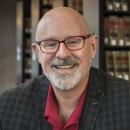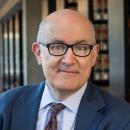No Smoking, but Only Temporarily?
Before the Illinois indoor smoking ban went into effect on Jan. 1, 2008, nearly every bar in the state allowed smoking. Nonsmokers complained about the effect on their lungs and the stench that clung to their clothes.
Now, no bars allow smoking. Libertarians and some others call that state paternalism and overreach.
Three Chicago Law professors came up with a third option. The smoking ban could be enacted only temporarily, leaving bar owners free to make up their own minds about whether they’d allow smoking after it expired. That might create a market equilibrium reflective of the desires of the public and the optimal bottom lines of business owners. The market might allow a mix of smoking and nonsmoking establishments.
Tom Ginsburg, Jonathan Masur, and Richard McAdams presented this proposal Tuesday during a Chicago’s Best Ideas lecture on their paper, “Libertarian Paternalism, Path Dependence, and Temporary Law.” It will be published in an upcoming issue of the University of Chicago Law Review.
“People like the experience of choosing, and don’t like being told what to do,” Ginsburg said. “At the same time, we know that many choices are determined by ingrained habits and patterns that may not be ideal. Our idea is that temporary law can help overcome informational barriers to finding better answers, while allowing markets to do what they do best.”
The idea was born when Ginsburg and McAdams taught at the University of Illinois and decided to study issues related to the Urbana and Champaign local smoking bans (enacted before the entire state went smoke-free). At first, they were interested in why bars and patrons complied with a law that had little risk of sanctions. But when local politics led to the repeal of the smoking ban in Champaign, they discovered that not every bar went back to smoking. Ginsburg and McAdams started to wonder why that might be, and later, they brought in Masur for his expertise in behavioral economics.
McAdams started the CBI talk by presenting the libertarian argument. According to a libertarian, the question of whether to allow smoking in bars and whether to patronize a bar are matters of individual choice. Businesses and customers can respond voluntarily to market conditions; that is, bars can choose the way to make the most money, and drinkers can choose whether they want to be around smoking. If there are no externalities—and libertarians do not believe that there are in this context—then the market will supply the correct amount of smoking and nonsmoking bars. Legal intervention is not necessary.
But that argument falls apart, McAdams said, if multiple different market outcomes are possible in the absence of regulation. It might be that the particular outcome that the market selects is the result of path dependence: the conditions that existed in the past might determine how the market responds in the future. Or, more simply: where we end up depends on where we begin.
The smoking ban, McAdams said, is an illustration of path dependence. There are a wide variety of reasons why any given status quo might endure. For instance, if nearly every bar allows smoking, smokers and nonsmokers alike could become acclimated to the smoking environment. Nonsmokers might not realize how much more they would appreciate a nonsmoking bar, and smokers might not understand how readily they could adapt. Smokers might also cling more firmly to their right to smoke, while nonsmokers, who possess no similar right, would not develop the same strong feelings. Because smoking had been allowed in bars for decades preceding the ban, it is likely that the status quo had endured because no individual bar owner or customer had an incentive to change behavior. But this implies that the market could have selected a different outcome, had it begun from a different starting point.
Masur presented the idea of temporary law, which would be enacted and then repealed after a number of years. If smoking were temporarily banned, and then the ban was lifted and bars were allowed to choose whether or not to allow smoking, it would be clear whether the market would select the same equilibrium as before the ban or some alternative. We could then compare the old equilibrium to the new—by examining things like bar revenue and patronage—to determine which equilibrium is superior.
Masur said he personally prefers nonsmoking bars, but he isn’t convinced that a situation where some percentage of bars allow smoking isn’t preferable for the broader population.
With “permanent law, you better hope you’re getting it right,” Masur said. With temporary law, “the whole point of it is to tell us something about the world.”
Ginsburg finished the presentation with other examples of temporary interventions in law and culture. For example, he said, affirmative action is a temporary remedy meant to right years of discrimination based on race and sex. He proposed that a temporary law requiring seatbelts might be a better solution than a permanent law; the government shouldn’t mandate everyone’s behavior permanently, but it could temporarily, to make it socially acceptable to wear a seatbelt. Ultimately, though, the law would expire and individuals would be allowed to choose for themselves.

